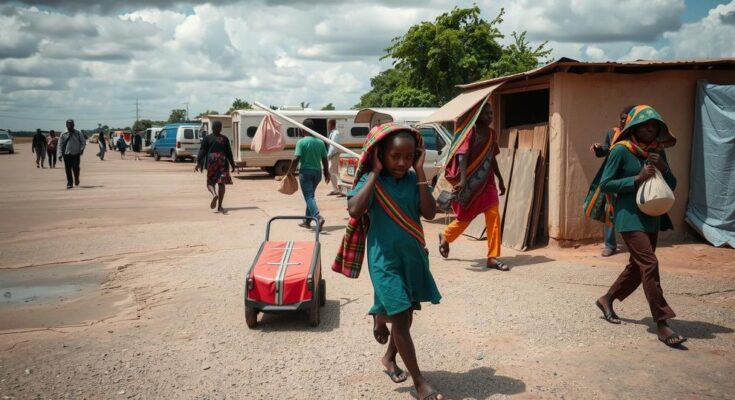Malawi has witnessed a significant influx of around 13,000 Mozambican refugees fleeing post-election violence. This situation echoes historical events during Mozambique’s civil war. The local government, alongside international organizations, is working to provide shelter and assistance, although resource challenges persist amidst an ongoing food crisis. The humanitarian response emphasizes the importance of addressing both the needs of the refugees and the local community.
On a sunny afternoon in Malawi, Manase Madia, a 50-year-old Mozambican, displays his identity card, once a mark of pride, now a symbol of uncertainty. In recent weeks, he has witnessed escalating violence, including the destruction of homes and businesses, leading to widespread displacement. Madia is among approximately 13,000 individuals who have sought refuge in Malawi following the post-election unrest in Mozambique. The situation echoes the civil war era, which saw nearly a million Mozambicans seeking asylum in Malawi in the past.
Following the October 11 elections in Mozambique, ongoing protests and violent uprisings have emerged, culminating in significant political unrest. Daniel Chapo, representing the ruling Frelimo party, was declared the winner over Venâncio Mondlane of the opposition, which sparked further violence. Initially directed towards political figures, the protests have evolved into rampant criminal activity. Madia recounted how concerted attacks targeted affluent community members, leaving many in fear for their lives, including his own family, which has been scattered by the violence.
Madia, who fled with his wife and one child, noted that many of his relatives remain in hiding. The perilous conditions have prompted numerous citizens to undertake the arduous journey to Malawi with little more than the clothes on their backs. Despite having experienced a significant food crisis due to drought, Malawians have shown remarkable hospitality towards the refugees, sharing a common language that eases communication as the government grapples with the influx.
Authorities in Malawi, aided by organizations like the UNHCR and the International Red Cross, are establishing makeshift shelters and assessing the immediate needs of the arrivals. Health concerns, particularly among children, require comprehensive strategies for sanitation and nutrition. With land allocated for refugee settlements and aid flowing in, officials like Hilda Katema Kausiwa emphasize the need for sustained support to address both immediate and long-term needs, ensuring safety and welfare for the refugee population.
Local humanitarian organizations are rallying resources and advocating for the wellbeing of both the refugees and host communities, insisting that further resources are critical to manage the strain on local services. This situation underscores the urgent need for enhanced humanitarian frameworks and sustainable programs to mitigate the challenges faced by displaced individuals and their hosts.
In light of the recent elections held on October 11, Mozambique has experienced a surge in violent protests and political instability. The ruling Frelimo party’s victory has been marred by allegations of unfair practices, leading to confrontations between citizens and authorities. As a result, an estimated 13,000 Mozambicans have fled to Malawi, seeking refuge from escalating violence reminiscent of the civil war during the late 20th century. Malawi, although already challenged by severe food shortages and economic difficulties, has welcomed these refugees, indicating a need for international assistance to support both refugees and the local population.
The influx of refugees into Malawi from Mozambique highlights the dire consequences of political unrest and the vital need for humanitarian intervention. As the situation evolves, it is imperative for both local and international communities to collaborate in addressing the complex needs arising from this crisis. The commitment of Malawians to aid those fleeing violence speaks volumes about the spirit of solidarity, yet it also raises concerns about resource allocation to ensure the welfare of both refugees and local citizens.
Original Source: www.theguardian.com




